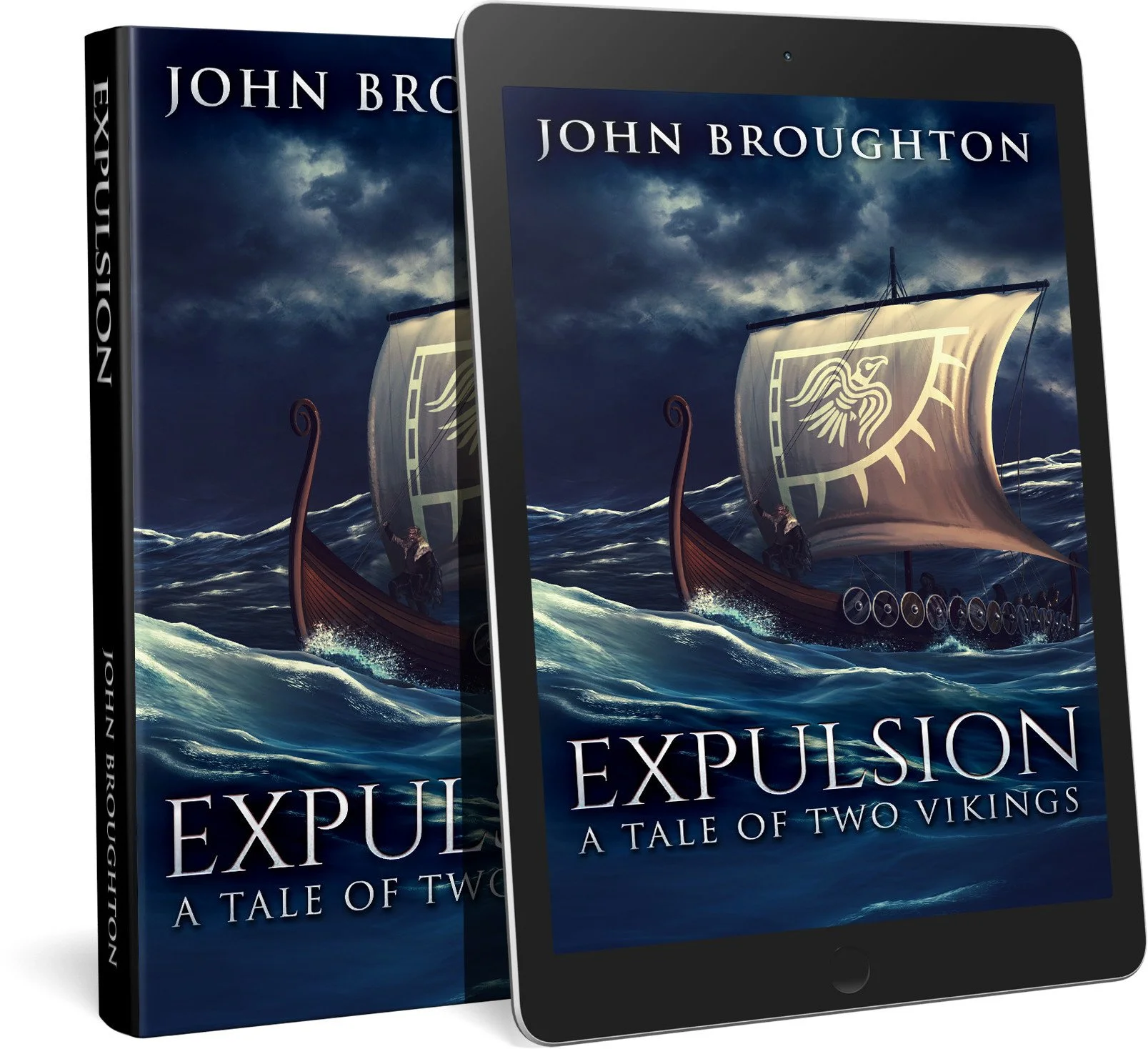Expulsion - John Broughton
Expulsion by John Broughton
Book excerpt
Áth Cliath longphort, Dublin 902 AD
The Norsemen and Irish-Norse retreated behind the ramparts of the longphort, the D-shaped enclosure whose straight side was the black Pool on the lower stretch of the River Poddle. The Norse longships were moored in this haven, and the longphort was designed to protect them from enemies such as those assailing Áth Cliath that day.
The screeching, spear-wielding Irish attacked in strength, the men of Brega under Mael Finnia, united with the warriors of Leinster under Cerball, son of Muirecáin, driving back the Norse, whom they regarded as unwelcome foreigners. They had every right to detest the Norsemen, whose incursions to plunder silver, rare holy books, and young men and women to sell as slaves in the east, they had endured for too long. The fury of the Irish made no distinction between the Norsemen and the Irish-Norse traders, the latter who had adopted many of their customs and intermarried with the native Irish. On this day, every last foe was fodder for their blades.
The wild whoops and war cries of the face-painted Irish resounded with triumph as they breached the defences of the longphort to pour into the compound.
Jarl Óttar, chieftain of a strong group of Irish-Norse traders, looked on with dismay as he tried valiantly to regroup his men, many of whom carried wounds that limited their fighting efficiency. Near the entrance, under severe pressure, King Ivarr, a direct descendant of Ivarr the Boneless, with his grandsons close to him, sold every yard of soil at a high price. Still, and inevitably, the weight of Irish numbers forced them backwards, step by step. Drawing nearer to their king, Óttar watched with horror as Ivarr’s grandson, Ragnall, failed to parry a thrust from the long pole of an Irish spear, which passed under his shield and entered his flesh at the shoulder. Jarl Óttar carried three axes, his battle-axe, which he transferred to his left hand and two throwing axes, tucked into his belt. The triumphant Irish spearman dropped the long-shafted weapon and, drawing his sword, closed in to slay the staggering Norse princeling. Pulling his throwing axe from his belt, at ten paces from the screaming red-haired Irish warrior, and relying on years of practice, Óttar hurled his axe unerringly to bury the sharply honed blade into the onrushing assailant’s neck. Blood sprayed over his enfeebled intended victim, already down on one knee, and gazing gratefully at his saviour. Óttar rushed over to him, waving to his brother Bárid, to cover him as he pulled an arm of the wounded Ragnall over his shoulders and, turning to half-carry-half-drag the young warrior towards the ships, knowing them realistically, to be their only hope of survival. Óttar’s men, seeing his intention, came running to form a defensive line to protect the short distance to the ships. They knew that was the only hope of making good their escape, too. King Ivarr, grateful for his grandson’s life, organised an orderly retreat to the boats, but the furious Irish compelled his men to fight every inch of the way.
From the safety of his ship, Óttar reflected on the quick thinking that had allowed him to haul Ragnall onboard. He gazed on in dismay as fleeing comrades, who had been slower to escape, met their doom. Luckily for the Norsemen, the Irish tribes did not favour bows, arrows, and javelins, otherwise, the slaughter would have been far worse. He watched one man, slowed by the weight of a wounded comrade on his shoulder, fall to a spear planted in his back. Near him, another, bearing an injured companion, lowered him to the ground, stood over him with a raised axe, and fought to a standstill with his last ounces of energy, preferring a glorious death and the embrace of the Valkyrie to being pierced by a spear jabbed from behind. The result was the same: his death.
Knowing when to cast off, which meant sacrificing those who could not reach the ship in time, was a terrible decision and, by taking it, Óttar would save the lives of those now on board, but also those on the other five vessels under his command, who would follow his example.
With heavy heart, unable to tear his gaze away from the futile resistance of the few Norsemen remaining on their feet, still able to fell an enemy before succumbing, he roared the command. Strong arms on the six ships shot the sleek vessels away from the shore with the practised ease of regular oarsmen. In vain, the frustrated, weary Irish spearmen flung their heavy poles, which inevitably fell short into the dark water of the bay. Óttar gazed around the deck as his few fit men raised the red and white striped sail. It shook, billowed, and filled, powering the ship farther from the shore of a land he had grown to love. The jarl reflected on the last few years.
He had left friendships behind, made with the native Irish, not to mention the pretty auburn-haired maid he loved. His fair trade, conducted between Brittany and Ireland, had gained him respect. Even so, he had to admit his faults. Examining his conscience, he acknowledged that he was part of the reason for that day’s disaster. He had led raids into Leinster and seized women and children to sell as slaves at the Verdun market. He had torched villages, pillaged livestock, silver, and holy books. It was the life he had known since childhood when he sailed on viking expeditions with his father, Óttar, whose name he bore with pride. What lay ahead, he did not know.
He shouted orders, his voice strained and hoarse with weariness. the urgent matter of escape dealt with, tending the wounded, some of the men almost half-dead had become the priority. Obediently, men hastened to give the stricken fresh water and to clean and bind their wounds. Setting an example, Óttar exposed Ragnall’s wound, swilled vinegar into it, admiring the young man for not flinching, and tied it tight with strips of spotless linen.
Many Norsemen drew their last breath on the blood-soaked soil of Áth Cliath, but a fleet of longships sailed forth with half their crews to go their separate ways. After tending to Ragnall’s wound, Óttar swayed with weariness, almost too tired to make a decision about a haven. He had avoided cuts, but his axe, now propped against a wooden rib of the open hull, had drunk more than its share of enemy blood. He realised that to take his men back to the Irish mainland was far too dangerous. He needed to rebuild his force before they could resume their past life of trading and viking activities.
In similar condition to Óttar, King Ivarr chose the easiest option to strike out for Scotland, the nearest landfall except for the Isle of Man. Other chieftains decided to sail for Man, yet others to the eastern shore of the Irish sea, some to Lancashire, and some to Cumbria. Jarl Óttar refused to follow anyone; he was a leader in his own right, so he called Bárid to join him in the prow to discuss their destination and to take a joint decision.
“Brother, I have traded in an area across the sea, where a good living can be made when we regain our strength, but most of all, nearby there is a river mouth that leads to a place where the land is formed of marsh, meres, and rivers. I know of a bank that will be easy to defend. We can eke out a living from the soil there. If you agree with me, we will be safe.”
“I have no better idea, Bárid. Order the steersman to set a course for your river mouth. I will call our other ships to follow.”
In truth, there was no need because the other five ships of Óttar’s bondsmen had never lost sight of their chieftain. Wherever he went, they followed. Óttar carried fresh water to the recumbent Ragnall, unstopped it and pressed the flask to his lips. Ragnall surprised him by taking the container from him and drinking without help. He noticed with pleasure that the deathly pallor had been replaced by a healthier colour in the visible parts of young man’s bearded cheeks.
Still, his voice was faint, and Óttar had to bend his head nearer to hear the words, “I owe my life to you. That was some throw that slew the Leinsterman!”














Praesent id libero id metus varius consectetur ac eget diam. Nulla felis nunc, consequat laoreet lacus id.